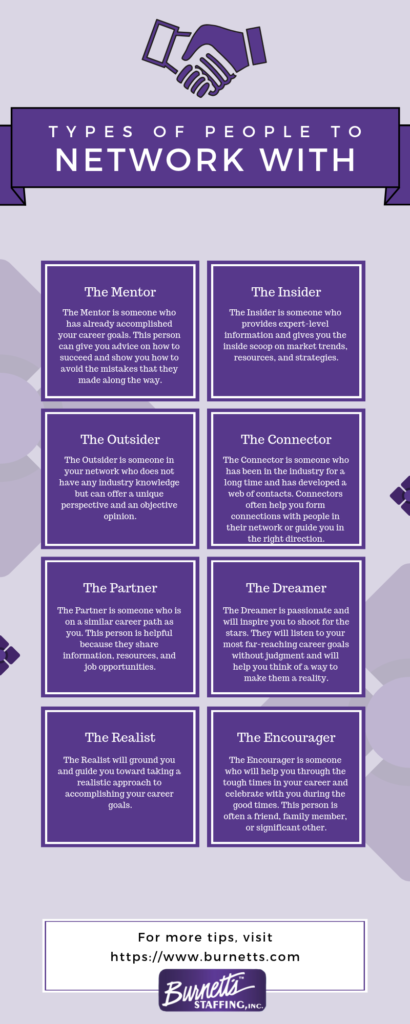
Building a professional network is one of the best ways to uncover exciting career opportunities. Forming the right connection can completely change the course of your career and greatly impact your long-term success—especially if you’re new to your profession.
Nevertheless, growing your professional network doesn’t happen overnight. Fortunately, there are several things you can start doing right now that will significantly improve your chances of connecting with the right people. Below you can learn more about how to build your professional network.
Prepare Your Elevator Pitch
When you only have a limited time to make an impression on a potential employer, it’s important to have a strong elevator pitch. Before you go to a networking event, formulate a short speech that you can give to potential employers when you meet them. The pitch should be simple, easy to understand, and should highlight your unique skills and experiences that set you apart from others.
To ensure that your pitch goes smoothly and sounds confident, we recommend practicing your delivery in the mirror or with a friend. Be prepared if an employer wants to know more about what you have to offer, and be ready to answer any of their questions. Don’t be afraid to engage with employers by asking follow-up questions to keep the conversation going; by doing so, you can establish a deeper connection.
Attend Networking Events
Networking events are a great way to meet a wide variety of contacts in the industry of your choice. Treat these events like an interview; dress nicely in hopes of making a good first impression and have business cards on hand so potential connections can easily contact you in the future. While you’re at the event, take the time to engage in meaningful conversations rather than just talking to as many people as possible. To save time and improve your chances of developing a useful contact, do your research on the companies that will be at the event beforehand. This will allow you to make a good first impression and help the conversation flow when you meet them.
Utilize Social Media
While the best way to make connections is face-to-face, it’s also a good idea to take advantage of online networking opportunities. Networking opportunities via LinkedIn groups and even Twitter chats are increasing in popularity, as they allow a sizable amount of people to participate regardless of their location.
When growing your online network, don’t just connect with as many people as possible. You should only request to follow people that you’ve dealt with professionally. You can be proactive about forming connections on social media by following companies that you’re interested in. You can then start establishing a relationship through sharing and commenting on their posts, then work your way toward engaging with them by asking career-related questions.
In addition to forming connections, you should strive to keep your profile up-to-date. As a rule, try to update your account at least every 90 days with new achievements, revised job descriptions, and a recent professional photo.
Follow Up
The conversation with your contact(s) shouldn’t end after you hand them your business card. You should always make an effort to follow up with everyone you connect with at a networking event. Take some time the morning after the event to email anyone you enjoyed speaking with. Let them know that you enjoyed meeting them, and thank them for the time they took to speak with you. As they likely met with a large number of people, it’s a good idea to remind them who you are by referencing something distinctive about your conversation. Lastly, let them know that you’re willing to help them if they need anything in the future, and include your contact information.
Keep In Touch
You can’t grow your network just by making new connections—you also need to nurture the relationships you already have. After forming a new connection, make sure that you stay in touch. A quality connection requires attention, and you should try your best to reach out to them periodically to ensure that they keep you in mind when opportunities arise. The best connections are mutually beneficial—contacts will be more likely to help you if you do something for them in return.
Now that you know how to grow your professional network check out the different types of connections you should seek to acquire.
Types of People to Network With
- The Mentor: Someone who has already accomplished your career goals. This person can give you advice on how to succeed and show you how to avoid mistakes they made along the way.
- The Insider: Someone who can give you the inside scoop on market trends, resources, strategies, and expert-level information.
- The Outsider: Someone in your network who does not possess any industry knowledge, but can give you a different perspective and an objective opinion.
- The Connector: The person who knows everyone. This person has been in the industry for a long time and has developed a broad web of contacts. Connectors are often eager to help you form connections with people in their network or at least guide you in the right direction.
- The Partner: Someone who is on a similar career path as you. This person will be helpful when it comes to sharing information, resources, and job opportunities.
- The Dreamer: These passionate dreamers will inspire you to shoot for the stars. They’ll listen to your most far-reaching career goals without judgment and will help you think of a way to make them a reality.
- The Realist: For every dreamer, you need a realist. This contact will help ground you and guide you toward taking a realistic approach to accomplishing your career goals.
- The Encourager: Someone who will help you through the tough times in your career journey and celebrate with you during the good. This person is often a friend, family member, or significant other.
Building a professional network isn’t easy. It takes time, patience, and hard work. But with these networking strategies, you’re sure to connect with someone who can help you accomplish your career goals and contribute to your long-term success.


